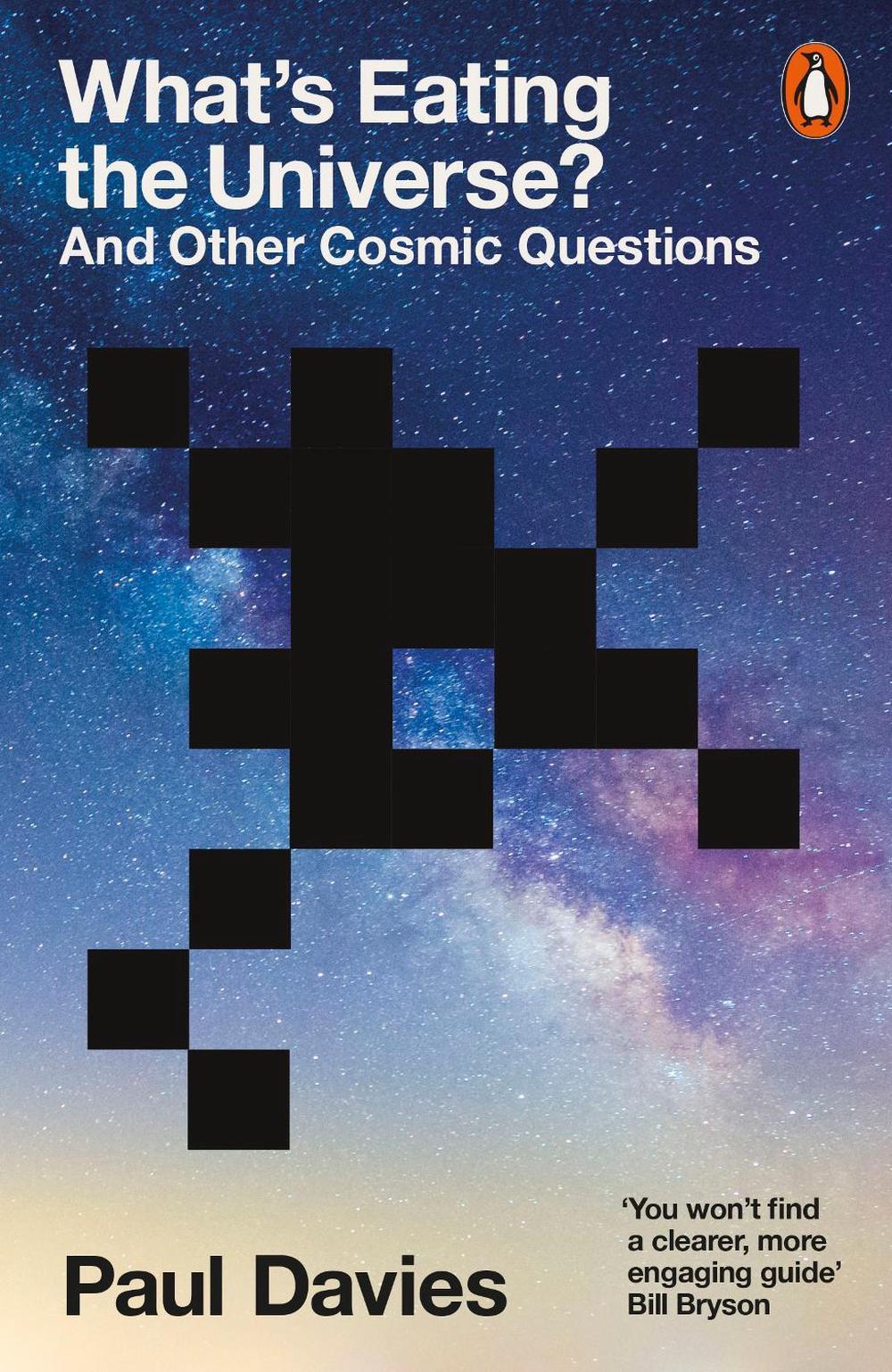
What's Eating the Universe?
and other cosmic questions
$22.63
- Paperback
192 pages
- Release Date
28 November 2022
Summary
Cosmic Conundrums: Unraveling the Universe’s Greatest Mysteries
The story of the universe in thirty cosmological conundrums.
In the constellation of Eridanus, there lurks a cosmic mystery. It’s as if something has taken a huge bite out of the universe, leaving a super-void. What could be the culprit? A supermassive black hole? Another, bigger universe? Or an expanding vacuum bubble, destined to envelop and annihilate everything in existence?
Scientists now understand…
Book Details
| ISBN-13: | 9780141993720 |
|---|---|
| ISBN-10: | 0141993723 |
| Author: | Paul Davies |
| Publisher: | Penguin Books Ltd |
| Imprint: | Penguin Books Ltd |
| Format: | Paperback |
| Number of Pages: | 192 |
| Release Date: | 28 November 2022 |
| Weight: | 147g |
| Dimensions: | 197mm x 128mm x 12mm |
You Can Find This Book In
What They're Saying
Critics Review
A delightful account of the cutting edge of modern cosmology. He is truly exceptional at explaining all of this in his inimitable style–let’s say ‘astropoetry’
Brilliant. You won’t find a clearer, more engaging guide to what we know (or would like to know) about the universe and how it is put together. – Bill Bryson * author of The Body: A Guide for Occupants *Paul Davies gives us a thought-provoking, fascinating, and delightful journey through some of the big questions that have perplexed and tantalized scientists throughout history. These are the questions and paradoxes that have stumped and teased history’s greatest minds. What happened before the beginning? What is the meaning of the universe? Are there other universes? – Michio KakuPaul Davies brings his customary lucidity to a survey of some of the most fascinating and puzzling aspects of our universe, simultaneously educating us about its vertiginous wonders and giving us a real sense of science’s questions as it confronts and explores them and wrestles with their mystery. It is an absorbing and stimulating read, one of the best of its kind. – A.C. Grayling * author of The Frontiers of Knowledge *Compelling … Davies excels in succinctly addressing the cosmological conundrums that haven’t received as much attention as dark matter, dark energy, what triggered the big bang and the fate of the universe * Forbes *A whistle-stop tour of the biggest mysteries that cosmologists are investigating today … a fun way of making sure you’re all caught up on where cosmology is at today * Physics World *What’s Eating the Universe? is a veritable feast for curious minds. Davies, a polymath and lyrical writer, masterfully tackles all the big questions ranging from why this Universe to the meaning of life and the significance of the present moment-a whirlwind journey through ideas that have shaped our understanding of the cosmos and its constituents. – Priyamvada Natarajan * author of Mapping the Heavens: The Radical Scientific Ideas That Reveal the Cosmos *A great introduction for readers new to physics …Lessons in cosmology and astrophysics abound in this enthusiastic primer * Publishers Weekly *Understanding theoretical physics is a daunting task, but What’s Eating the Universe?is here to guide readers through the field. Each chapter is short-less than 10 pages-but jargon-free and full of information … Regardless of the reader’s prior physics knowledge, the book provides an accessible introduction to cosmology * Physics Today *What’s Eating the Universe? is Paul Davies at his very best. He brings a lifetime of experience in explaining mysteries of space and time to offer thought-provoking essays on deep questions in bite-sized, easily digestible chunks. There is no better overview of the advances made by cosmologists in recent decades. – John Gribbin * author of Six Impossible Things: The ‘Quanta of Solace’ and the Mysteries of the Subatomic World *A delightful account of the cutting edge of modern cosmology. He is truly exceptional at explaining all of this in his inimitable style–let’s say ‘astropoetry’ – Simon Mitton, University of Cambridge
About The Author
Paul Davies
Paul Davies is a theoretical physicist, cosmologist, astrobiologist, author and broadcaster. He is a college professor at Arizona State University, where he established a new centre on foundational questions in science, encompassing cosmology, life, astrobiology and philosophy. He has achieved an international reputation for his ability to explain the significance of advanced scientific ideas in simple language. He is the author of some twenty-five books including The Mind of God, The Last Three Minutes and How to Build a Time Machine. Among other awards he has won the Templeton Prize, The Royal Society’s Michael Faraday Prize for science communication and a Glaxo Science Writers’ Fellowship. The asteroid 1992 OG was officially named (6870) Pauldavies in his honour. Davies writes regularly for newspapers, journals and magazines in several countries. He has contributed to BBC Radio 3 documentaries, and his television work has included chat shows and scripting/presenting documentaries, including his own series entitled The Big Questions and More Big Questions. Committed to bringing science to the wider public, Davies engages in a heavy program of public lecturing around the world, addressing scientific and religious topics. As a supporter of the arts, he is frequently involved in literary and artistic events. He won the Eureka Prize in 1991 for the promotion of science in Australia, and in 1993 he was presented with an Advance Australia Award for outstanding contributions to science. In 1995 Davies was awarded the Templeton Prize for progress in religion. Paul Davies is married, and has four children. He remains a British citizen. In addition to his passion for both traditional and contemporary art, he is interested in the history of the second world war, politics and economics. He also enjoys keeping fit and discussing geographical trivia.
Returns
This item is eligible for free returns within 30 days of delivery. See our returns policy for further details.




